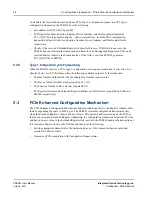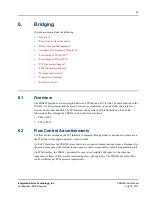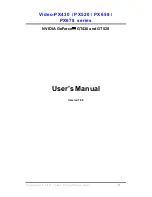
6. Bridging > Message Transactions
55
PEB383 User Manual
July 25, 2011
Integrated Device Technology, Inc.
Confidential - NDA Required
6.9
Message Transactions
Message transactions are used for in-band communication of events, and therefore, eliminate the need
for sideband signals. PCIe messages are routed depending on specific bit field encodings in the
message request header.
6.9.1
INTx Interrupt Signaling
The PEB383 forwards the INTx interrupts – PCI_INT[A:D]n – generated by PCI devices onto the PCIe
Interface, as PCIe Assert_INTx and Deassert_ INTx messages (for more information, see
).
6.9.2
Power Management
Power management messages support Power Management Events (PME) signaled by sources
integrated into the bridge and for devices downstream of the bridge. The PEB383 forwards the power
management events (PCI_PMEn) from PCI devices onto the PCIe Interface using PCIe PME messages
(for more information, see
).
6.9.3
Locked Transaction
Unlock messages support locked transaction sequences in the downstream direction. This type of
message indicates the end of a locked sequence. The PEB383 supports locked transactions in the
downstream direction and uses unlocked messages to unlock itself from the PCIe Interface (see
).
6.9.4
Slot Power Limit
These messages are transmitted to downstream devices by the root complex or a switch. The PEB383
copies the set slot power limit payload into the Set Slot Power Limit Scale and Set Slot Power Value
fields of the
“PCIe Device Capabilities Register”
6.9.5
Vendor-defined and Device ID
These messages are used for vendor-specific purposes. The PEB383 does not support forwarding of
these messages. It terminates Device ID message transactions on the PCI Interface with Master-Abort.
It silently discards the Vendor-defined Type 1 message TLPs and handles the Vendor-defined Type 0
message TLPs as Unsupported Requests.
The PEB383 ignores the receipt of Ignored messages. It handles the receipt of Error signaling messages
as Unsupported Requests. The PEB383 handles the receipt of INTx messages as malformed TLPs.
















































